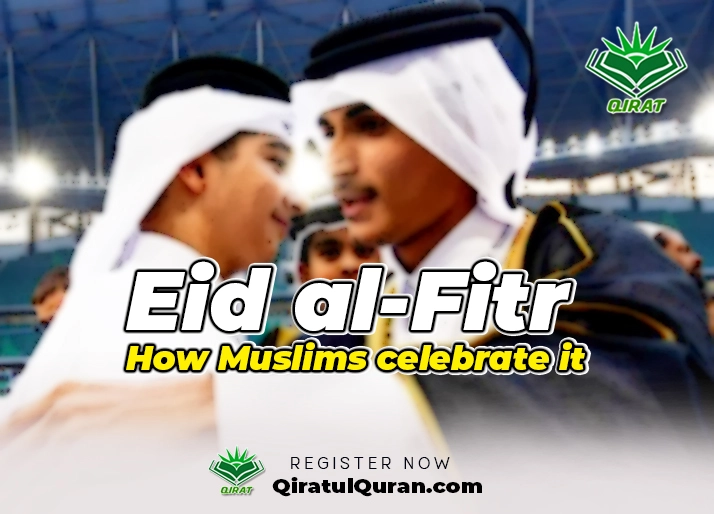
What is Eid al-Fitr?
Eid al-Fitr, also known as “The Festival of Breaking the Fast”, is one of the two major Islamic religious festivals celebrated worldwide by Muslims. It marks the end of Ramadan, the Islamic month of fasting.
When is Eid al-Fitr Celebrated?
Eid al-Fitr begins on the first day of Shawwal, the month that follows Ramadan in the Islamic lunar calendar. Since the Islamic calendar is lunar based, the date of Eid changes every year and comes about 11 days earlier each successive year, in line with the lunar cycle.
Eid celebrations last between 1-3 days, depending on the country. For example, in Saudi Arabia, the celebrations tend to last 2-3 days whereas Pakistan has a 1-day holiday.
Origins and Significance
Eid al-Fitr has origins dating back to the period when Prophet Muhammad S.A.W migrated from Mecca to Medina where the first Eid sermon was recited. Over the centuries, Eid rituals have evolved into joyous communal celebrations across the Muslim world that reinforce solidarity and fraternity.
For Muslims, Eid al-Fitr is a day that marks their spiritual renewal after a month of sacrifice, worship, charity, and abstinence from worldly pleasures like food and drink during daylight hours. It reinforces gratitude towards Allah for giving believers the strength and commitment to carry out their religious duties during Ramadan’s intense yet rewarding experience.
Eid is hence both, a celebration of this achievement and an expression of gratitude for God’s mercy.
How do Muslims Prepare for and Celebrate Eid al-Fitr?
Muslims carry out several religious and cultural rituals to mark the joyous occasion of Eid-al-Fitr. Here are some of the most notable ones:
Observing Charity and Community Outreach
In the weeks leading up to Eid, Muslims make efforts to give out increased charity so those less fortunate can participate in the festivities. Zakat al-Fitr, an obligatory almsgiving tradition requires Muslims to donate staple food items or their cash equivalent to the poor before Eid prayers. Community outreach efforts also intensify through the organization of food drives and voluntary work.
Shopping for New Clothes
It is customary for Muslims to buy new garments and footwear for themselves and family members that are worn on Eid day. In Muslim-majority countries, bazaars stock up weeks in advance on vibrant clothes, sweets, and decorative items. Purchasing new items signifies renewal that mirrors the spiritual cleansing achieved during Ramadan and appreciation for what God has provided.
Night-Time Community Gatherings
Muslims celebrate community ties on the last couple nights of Ramadan by taking part in socially and religiously significant community gatherings held at mosques or public spaces. Called Qiyam-ul-lay or i’tikaf, worshippers spend the night offering additional prayer, reciting the Quran, and supplicating which transitions into the Eid spirit. In the morning, Muslims celebrate Eid.
Eid Prayers
The Eid day begins with elaborate morning preparations to get dressed up in the finest new clothes for special congregational prayers held outdoors or in mosques. Called the Salat al-Eid, it includes the regular cycles of standing, bowing, and prostration seen in the five daily prayers as well as additional sermons and supplications specific to the occasion of Eid that invoke the glory of God and the inclusiveness of all His creations.
Eid prayers have no call for prayer or adhan that announces the other mandatory prayers and can be offered anytime after sunrise until midday. The prayer is generally followed by brief additional sermons or words of wisdom and advice for the community.
Socializing and Family Visits
After Eid prayers as well as for the remainder of the day, Muslim communities partake in celebrations centered around socializing with their extended families, neighbors, and friends as well as caring for those marginalized.
Lavish meals are prepared in homes to welcome guests over the day and night. In various cultures, this involves delicacies like mouth-watering Biryanis, delectable kebabs, and simmering curries along with an assortment of desserts such as vermicelli kheer and rice cakes.
Gifts and money are given to children and juniors to signify the elder’s blessings for the occasion. After all, Eid translates to “celebration” and so the day is marked by remembering God’s blessings, bringing joy to others including through charity while strengthening community ties.
Indulging in Joyous Festivities
Public areas also come alive with the resonance of popular activities that are common sights during any Muslim festival – stalls offering traditional food and drink, vendors selling toys and candy helping the occasion’s spike in children’s demands, and amusement rides lighting up across parks and makeshift melas (fairs).
In Muslim minority countries, community members flock to these public spaces to experience the fanfare, bond over their Islamic identities, and spread the inclusive joy central to Eid-al-Fitr.
Eid hence becomes the embodiment of the mission it commemorates – the joyous attainment of spiritual refinement and an inclusive fraternity between believers united by their common Islamic faith achieved through a month of immense struggle and sacrifice.
Conclusion
Marked by prayers, charity, community outreach, family reunions, and joyous festivities; Eid al-Fitr celebrations speak to a sense of spiritual and social renewal among Muslim communities after their transformative experience of fasting, prayer, and reflection in Ramadan. It reinforces devotion towards God as well as commitment to upholding Islamic ideals of sacrifice, self-purification, inclusivity, and compassion towards all fellow beings beyond just the holy month.
In essence, Eid al-Fitr festivities celebrate the human capacity to overcome immense inner and worldly struggles to attain moral and spiritual enlightenment through self-restraint, inclusive communities, and gratitude towards the divine.


